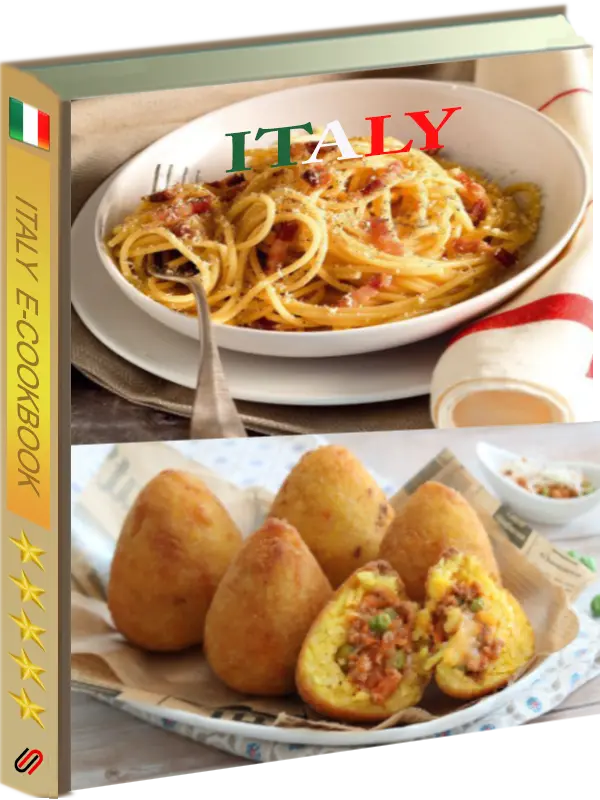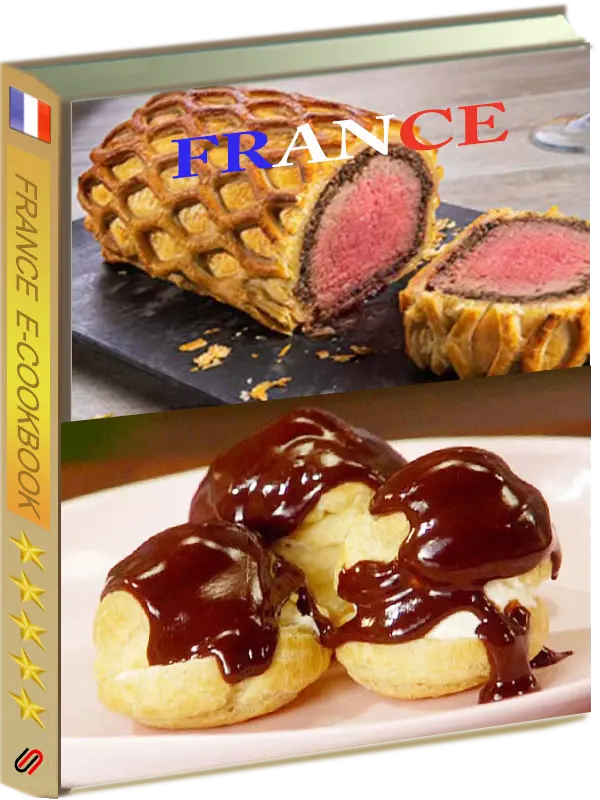faroe-islands Is My Kitchen
FAROE-ISLANDS Breakfast Appetizers & Soups
FAROE-ISLANDS Main Dishes
liquid Measures
Weight & temperature Measures
non-liquid ingredients
Top 5 countries
Last Page
Braised leg of lamb cleopatra
Brochettes of lamb
Crown roast of lamb in a parmesan-sage crust
Curried lamb
Eggplant and lamb cake with a garlic jus
Fish and chips
Florentine lamb chops
Herb roasted leg of lamb
Lamb shanks braised in red wine
Lamb stew
Leg of baby lamb nicoise
Navarin of lamb with vegetables
Rack of lamb with mushroom crust
Roasted lamb rib eye with sweet garlic
FAROE-ISLANDS Desserts
Brochettes of lamb
Crown roast of lamb in a parmesan-sage crust
Curried lamb
Eggplant and lamb cake with a garlic jus
Fish and chips
Florentine lamb chops
Herb roasted leg of lamb
Lamb shanks braised in red wine
Lamb stew
Leg of baby lamb nicoise
Navarin of lamb with vegetables
Rack of lamb with mushroom crust
Roasted lamb rib eye with sweet garlic
Weight & temperature Measures
non-liquid ingredients
Top 5 countries
Last Page
The Faroe Islands, a mountainous archipelago two hundred miles north of Scotland, has a landmass of only five hundred and forty square miles, and is sparsely populated with fifty thousand people and seventy thousand sheep.
Fermented food is maybe the most important cultural heritage.
Among the prominent ingredients are lamb, fish, shellfish, seaweed, and root vegetables, potatoes and turnips.
Thanks to a perfect combination of constant low temperatures and wind, and high concentration of salt in the air, the Faroese developed a salt-free method for preserving meat and fish: ræst.
This tradition (which translates to fermentation) involves hanging meat and fish out in the open, then in drying houses, where time and the natural elements work their magic.
Fermented food is maybe the most important cultural heritage.
Among the prominent ingredients are lamb, fish, shellfish, seaweed, and root vegetables, potatoes and turnips.
Thanks to a perfect combination of constant low temperatures and wind, and high concentration of salt in the air, the Faroese developed a salt-free method for preserving meat and fish: ræst.
This tradition (which translates to fermentation) involves hanging meat and fish out in the open, then in drying houses, where time and the natural elements work their magic.
Main Braised leg of lamb cleopatra 
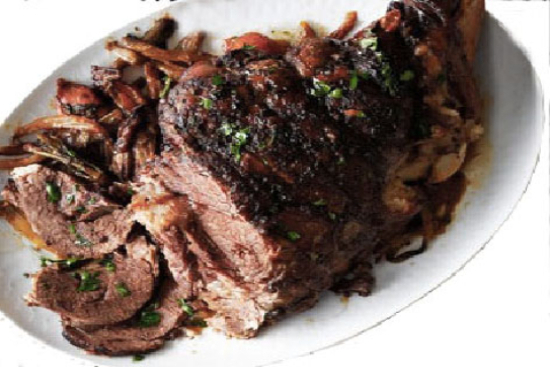
This is a recipe from restaurant Daniel in New York City. It is great. Rubbing the leg of lamb with a combination of 11 spices, then baking it slowly for 3 hours with a vegetable garnish produces an exquisitely tender and aromatic dish.
Serves: 8
8 garlic cloves
salt and pepper to taste
1/4 cup olive oil
3 cups onions, chopped
4 cups carrots, chopped
3 cups celery, chopped
2 cups fennel, chopped
1 jalapeño, seeded, minced
4 cups tomatoes, peeled, chopped
6 cups chicken stock
1/4 cup italian parsley, chopped
Spice mix
Combine the following spices, all ground
2 tablespoons cumin
2 teaspoons cinnamon
1 teaspoons allspice
1 tablespoon coriander
1/2 teaspoon nutmeg
1/2 teaspoon fennel seeds
1 tablespoon cardamon
1 teaspoons ginger
1/2 teaspoon star anise
1 teaspoon cayenne pepper
a pinch cloves
Couscous
1 pound instant couscous
2 cups chicken stock
1 teaspoon honey
1/4 cup golden raisins, small
3 tablespoons sweet butter
1/4 cup pine nuts, toasted
2 tablespoons coriander, chopped
Serves: 8
Preparation time: 20 minutes
Cooking time:3 hours
1 whole leg of lamb 8 garlic cloves
salt and pepper to taste
1/4 cup olive oil
3 cups onions, chopped
4 cups carrots, chopped
3 cups celery, chopped
2 cups fennel, chopped
1 jalapeño, seeded, minced
4 cups tomatoes, peeled, chopped
6 cups chicken stock
1/4 cup italian parsley, chopped
Spice mix
Combine the following spices, all ground
2 tablespoons cumin
2 teaspoons cinnamon
1 teaspoons allspice
1 tablespoon coriander
1/2 teaspoon nutmeg
1/2 teaspoon fennel seeds
1 tablespoon cardamon
1 teaspoons ginger
1/2 teaspoon star anise
1 teaspoon cayenne pepper
a pinch cloves
Couscous
1 pound instant couscous
2 cups chicken stock
1 teaspoon honey
1/4 cup golden raisins, small
3 tablespoons sweet butter
1/4 cup pine nuts, toasted
2 tablespoons coriander, chopped
Blend the spices into a blender to obtain a fine powder.
Preheat oven to 375 degrees.
Remove lamb hip bone.
Make 18 incisions all around meat with a small knife. Insert small garlic sticks in meat.
Rub lamb with 4 tablespoons of the spice mix, and salt and pepper. Heat olive in a deep roasting pan, brown the lamb on all sides over high heat.
Add remaining garlic, onions, carrots, celery, fennel, and jalapeño. Stir well. Add tomatoes, 1 tablespoon spice mix, and salt. Cover pan, and roast for 1 hour.
Add hot chicken stock to lamb; Decrease oven temperature to 300 degrees. Cover and cook another 2 hours. Turn lamb every 20 minutes.
Remove lamb from pan with vegetables. Add parsley to sauce with salt and pepper; Spread couscous into a casserole. Pour hot chicken stock, honey and 1/2 tablespoon spice mix, and raisins over couscous. Cover. Remove from heat. Add butter, pine nuts, and coriander leaves. Keep warm until ready to serve.
Arrange lamb and vegetables on a platter. Cover with sauce. Carve meat and serve with couscous.
Preheat oven to 375 degrees.
Remove lamb hip bone.
Make 18 incisions all around meat with a small knife. Insert small garlic sticks in meat.
Rub lamb with 4 tablespoons of the spice mix, and salt and pepper. Heat olive in a deep roasting pan, brown the lamb on all sides over high heat.
Add remaining garlic, onions, carrots, celery, fennel, and jalapeño. Stir well. Add tomatoes, 1 tablespoon spice mix, and salt. Cover pan, and roast for 1 hour.
Add hot chicken stock to lamb; Decrease oven temperature to 300 degrees. Cover and cook another 2 hours. Turn lamb every 20 minutes.
Remove lamb from pan with vegetables. Add parsley to sauce with salt and pepper; Spread couscous into a casserole. Pour hot chicken stock, honey and 1/2 tablespoon spice mix, and raisins over couscous. Cover. Remove from heat. Add butter, pine nuts, and coriander leaves. Keep warm until ready to serve.
Arrange lamb and vegetables on a platter. Cover with sauce. Carve meat and serve with couscous.
Main Brochettes of lamb 
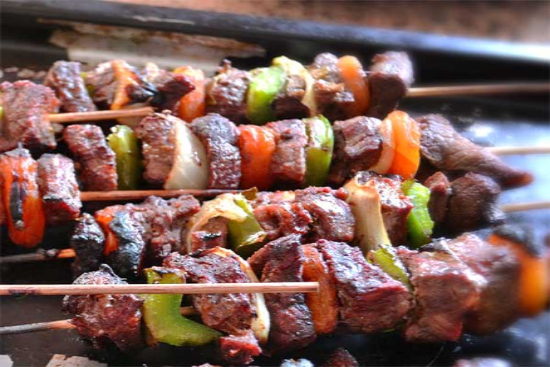
Serves: 4
Preparation time: 20 minutes
Cooking time:15 minutes
1 teaspoon fresh thyme leaves 1 teaspoon fresh rosemary leaves
3 cloves garlic, peeled
2 tablespoons chopped parsley
1/4 teaspoon black ground pepper
1/3 cup olive oil
1 1/2 pounds boned leg of lamb into 16 cubes
2 medium red peppers
2 medium onions, peeled
Combine in the bowl of a food processor thyme leaves, rosemary, garlic, and parsley. Process until mixture is minced. Transfer to a bowl, and add pepper and olive oil.
Transfer the marinade to a shallow dish, about 10 inches long. Cut the peppers and onions into 1 1/2-inch squares pieces.
Thread the lamb on four 12-inch metal skewers alternately with the peppers and onions.
Put the brochettes in the marinade, turning them so that they are well coated.
Let them marinate at room temperature for 2 hours or longer, turning them every 30 minutes.
Sprinkle the brochettes with salt and pepper.
Broil or grill them over high heat, turning them occasionally, for 12 minutes or until the lamb is well browned.
Serve the lamb brochettes with rice or couscous.
Transfer the marinade to a shallow dish, about 10 inches long. Cut the peppers and onions into 1 1/2-inch squares pieces.
Thread the lamb on four 12-inch metal skewers alternately with the peppers and onions.
Put the brochettes in the marinade, turning them so that they are well coated.
Let them marinate at room temperature for 2 hours or longer, turning them every 30 minutes.
Sprinkle the brochettes with salt and pepper.
Broil or grill them over high heat, turning them occasionally, for 12 minutes or until the lamb is well browned.
Serve the lamb brochettes with rice or couscous.
Main Crown roast of lamb in a parmesan-sage crust 
Serves: 8
Preparation time: 20 minutes
Cooking time:55 minutes
1 crown roast of lamb 2 teaspoons minced fresh sage
2 tablespoon parmesan cheese
2 tablespoon bread crumbs
2 cloves garlic, peeled and minced
salt and ground pepper to taste
Preheat oven to 425 degrees.
Place the roast, crown side down, in a roasting pan. Bake for 35 to 55 minutes according to he degree of doneness.
Meanwhile, combine the sage, Parmesan, bread crumb and garlic, salt and pepper in a bowl.
Remove the roast from the oven and pat the sage mixture on the outside of the roast.
Bake for 5 more minutes. Remove from oven. Cut the roast and serve immediately.
Place the roast, crown side down, in a roasting pan. Bake for 35 to 55 minutes according to he degree of doneness.
Meanwhile, combine the sage, Parmesan, bread crumb and garlic, salt and pepper in a bowl.
Remove the roast from the oven and pat the sage mixture on the outside of the roast.
Bake for 5 more minutes. Remove from oven. Cut the roast and serve immediately.
Main Curried lamb 
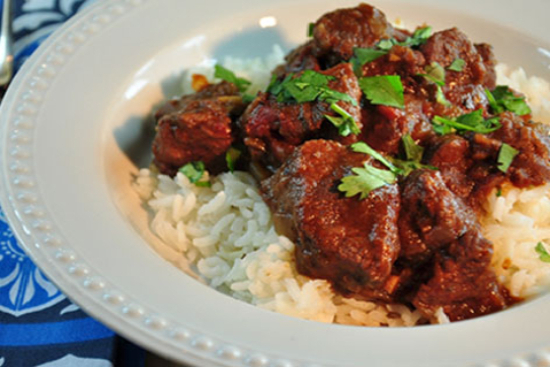
Serves: 8
Preparation time: 20 minutes
Cooking time:2 hours
2 tablespoons olive oil 4 pounds lamb shoulder, cut into 2 inch pieces
2 medium onions
1 tablespoon tomato paste
2 tablespoons flour
1/2 teaspoon salt
1/4 teaspoon ground black pepper
1 heaping tablespoon good curry powder
chicken stock
1 cup Granny Smith apples, peeled and diced
1 banana
1 clove garlic, peeled
1 sprig thyme
1 bay leaf
1/2 cup raisins
1 Granny Smith apple
Serve with rice and chutney
Preheat oven to 350 degrees.
In oven-proof skillet, heat up oil to a smoking point. Brown the lamb pieces.
Peel and chop onions finely. Mix with he lamb and brown lightly. Add tomato paste, salt, pepper, flour and curry.
Blend well with the lamb and cook over medium heat for 2 to 3 minutes.
Cover the meat with chicken stock. Stir well until sauce thickens. Add the chopped garlic clove, diced apples and sliced banana. Bring to a boil. Add thyme and bay leaf.
Cover pot and place in oven for about 1 hour 30 minutes or until meat is tender.
Transfer the pieces of lamb to a clean pot. Strain the sauce over the meat, pressing with a ladle to extract all the sauce.
Peel, core and dice the apple. Combine with the raisins and blend into the curried lamb.
Simmer over low heat for 15 minutes.
Transfer to a serving dish. Serve with rice and chutney.
In oven-proof skillet, heat up oil to a smoking point. Brown the lamb pieces.
Peel and chop onions finely. Mix with he lamb and brown lightly. Add tomato paste, salt, pepper, flour and curry.
Blend well with the lamb and cook over medium heat for 2 to 3 minutes.
Cover the meat with chicken stock. Stir well until sauce thickens. Add the chopped garlic clove, diced apples and sliced banana. Bring to a boil. Add thyme and bay leaf.
Cover pot and place in oven for about 1 hour 30 minutes or until meat is tender.
Transfer the pieces of lamb to a clean pot. Strain the sauce over the meat, pressing with a ladle to extract all the sauce.
Peel, core and dice the apple. Combine with the raisins and blend into the curried lamb.
Simmer over low heat for 15 minutes.
Transfer to a serving dish. Serve with rice and chutney.
Main Eggplant and lamb cake with a garlic jus 
Serves: 6
Preparation time: 30 minutes
Cooking time:1 hour 30 minutes
For the lamb medallions: 12 lamb chops from the rack
salt, freshly ground pepper
1 tablespoon olive oil
For the lamb jus:
3 cloves garlic, peeled and thinly sliced
2 sprigs fresh thyme
1/4 cup onions, peeled and coarsely chopped
1 teaspoon ground cumin
10 coriander seeds
2 teaspoons tomato paste
1 cup dry white wine
For the vegetables:
5 tablespoons olive oil
3 large eggplants, peeled, ends trimmed, and sliced lengthwise into 1/4-inch-wide strips
salt and freshly ground pepper to taste
2 large tomatoes, cored, peeled, and sliced
1/4 inch thick
2 cups white mushrooms, caps only, sliced
1 cup onions, peeled and thinly sliced
2 pounds spinach leaves, stems removed, thoroughly washed, drained and blanched in boiling water
2 cloves garlic, peeled and chopped
For the lamb medallions:
Bone and trim lamb chops. (reserve the trimmed bones for the jus)
Flatten medallions slightly on a cutting board using a mallet.
Season with salt and pepper.
Heat a large roasting pan on high heat on top of the stove with olive oil. Brown lamb chops on each side, 2 minutes for rare, 3 to 4 minutes for medium, 5 to 7 minutes for well-done.
Remove the lamb and set aside to cool.
For the lamb jus:
Preheat oven to 425 degrees. Add the reserved lamb bones to the roasting pan and roast in the oven for 45 to 50 minutes. Add the garlic, thyme, onions, cumin, and coriander seeds and roast for another 10 minutes.
Remove from the oven and place the pan on the stove. Add the tomato paste, stir well, add the white wine, and reduce over high heat until all the moisture is evaporated. Add 1 cup water, simmer gently, and reduce.
Strain over a small bowl and set the sauce aside. Discard the sauce and herbs.
For the vegetables:
Preheat oven to 425 degrees. Brush a baking pan with olive oil. Place the eggplant strips side by side in the pan. Brush the top with olive oil, then season with salt and pepper.
Bake the eggplant in the oven until soft, lightly roasted and golden, about 20 minutes.
Finish cooking under the broiler if necessary. Remove the eggplants with a spatula and set aside to cool.
Use the same pan, brush with olive oil. Sprinkle it with salt and pepper. Arrange the tomato slices in the pan and roast them in the oven for about 20 minutes or until baked and lightly dried.
Heat 1/2 tablespoon of olive in a heavy skillet.
Sauté mushrooms over high for 5 minutes. Add onions and cook for 5 more minutes.
Season with salt and pepper and transfer to a plate.
To assemble cake, line the bottom of an 8-inch springform cake pan (or regular cake pan lined with parchment paper) with the cooked slices of eggplants, placing the narrow end of the eggplant in the center of the mold and the large end resting over the rim of the mold. Slightly overlap the next slice on the first one and continue lining the pan with the remaining eggplant slices.
Spread the mushroom mixture over the eggplant. Place the baked tomatoes over the mushrooms. Flatten with a spoon. Place the lamb medallions over the tomatoes. Place the spinach over the lamb. Press to flatten. Fold the large ends of eggplant slices over spinach. Press down firmly with a spatula or a plate. Heat the lamb in a 350 degree oven for 15 to 20 minutes.
Heat the lamb jus.
To serve:
Invert the eggplant cake on a round platter and unmold it. Serve the warm lamb jus on the side. Cut cake into wedges around lamb medallions.
Bone and trim lamb chops. (reserve the trimmed bones for the jus)
Flatten medallions slightly on a cutting board using a mallet.
Season with salt and pepper.
Heat a large roasting pan on high heat on top of the stove with olive oil. Brown lamb chops on each side, 2 minutes for rare, 3 to 4 minutes for medium, 5 to 7 minutes for well-done.
Remove the lamb and set aside to cool.
For the lamb jus:
Preheat oven to 425 degrees. Add the reserved lamb bones to the roasting pan and roast in the oven for 45 to 50 minutes. Add the garlic, thyme, onions, cumin, and coriander seeds and roast for another 10 minutes.
Remove from the oven and place the pan on the stove. Add the tomato paste, stir well, add the white wine, and reduce over high heat until all the moisture is evaporated. Add 1 cup water, simmer gently, and reduce.
Strain over a small bowl and set the sauce aside. Discard the sauce and herbs.
For the vegetables:
Preheat oven to 425 degrees. Brush a baking pan with olive oil. Place the eggplant strips side by side in the pan. Brush the top with olive oil, then season with salt and pepper.
Bake the eggplant in the oven until soft, lightly roasted and golden, about 20 minutes.
Finish cooking under the broiler if necessary. Remove the eggplants with a spatula and set aside to cool.
Use the same pan, brush with olive oil. Sprinkle it with salt and pepper. Arrange the tomato slices in the pan and roast them in the oven for about 20 minutes or until baked and lightly dried.
Heat 1/2 tablespoon of olive in a heavy skillet.
Sauté mushrooms over high for 5 minutes. Add onions and cook for 5 more minutes.
Season with salt and pepper and transfer to a plate.
To assemble cake, line the bottom of an 8-inch springform cake pan (or regular cake pan lined with parchment paper) with the cooked slices of eggplants, placing the narrow end of the eggplant in the center of the mold and the large end resting over the rim of the mold. Slightly overlap the next slice on the first one and continue lining the pan with the remaining eggplant slices.
Spread the mushroom mixture over the eggplant. Place the baked tomatoes over the mushrooms. Flatten with a spoon. Place the lamb medallions over the tomatoes. Place the spinach over the lamb. Press to flatten. Fold the large ends of eggplant slices over spinach. Press down firmly with a spatula or a plate. Heat the lamb in a 350 degree oven for 15 to 20 minutes.
Heat the lamb jus.
To serve:
Invert the eggplant cake on a round platter and unmold it. Serve the warm lamb jus on the side. Cut cake into wedges around lamb medallions.
Main Fish and chips 
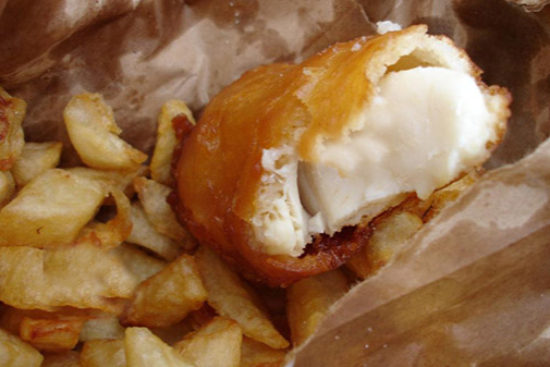
Serves: 6
Preparation time: 30 minutes
Cooking time:20 minutes
2 pounds boned and skinned cod 1/2 teaspoon salt
1 recipe batter for fish (recipe below)
2 pounds baking potatoes
6 lemon wedges
oil for frying
BATTER FOR FISH
1/2 cup flour
1/2 cup pancake flour
1/2 cup cornstarch
2 tablespoons baking powder
1 egg
1 cup water
Cod can be substituted with other white firm skinless, and boneless fish.
Cut fish into 5 oz. (140 g) pieces. Wash under cold water and dry. Season with salt. Coat in the cold batter.
Deep fry at 360 F. (190 C) for 4 to 5 minutes. Arrange on a warm dish lined with a napkin.
Serve with chips and lemon pieces, or the traditional malt vinegar.
(The chips are actually large French fried potatoes, made with the baking potatoes, and deep fried.
BATTER FOR FISH
In a large mixing bowl, combine all dry ingredients. Beat egg and water. Blend in dry ingredients until smooth.
Cut fish into 5 oz. (140 g) pieces. Wash under cold water and dry. Season with salt. Coat in the cold batter.
Deep fry at 360 F. (190 C) for 4 to 5 minutes. Arrange on a warm dish lined with a napkin.
Serve with chips and lemon pieces, or the traditional malt vinegar.
(The chips are actually large French fried potatoes, made with the baking potatoes, and deep fried.
BATTER FOR FISH
In a large mixing bowl, combine all dry ingredients. Beat egg and water. Blend in dry ingredients until smooth.
Main Florentine lamb chops 
Serves: 4
Preparation time: 15 minutes
Cooking time:20 minutes
8 lamb chops, trimmed 1 tablespoon olive oil
1 teaspoon dried thyme
1/4 teaspoon ground black pepper
10 ounces cooked spinach, drained and chopped
6 ounces cream cheese
1 egg
1/2 cup grated Parmesan cheese
1/4 cup chopped onion
1/8 teaspoon ground nutmeg
1/2 teaspoon salt
Brush lamb chops with oil, season with thyme and black pepper.
Broil 4 to 6 minutes on each side or until desired doneness. Remove from broiler, cover and set aside.
In a saucepan, combine cream cheese, egg, Parmesan cheese, onion and nutmeg. Cook over low heat while stirring for 10 minutes or until cream cheese is melted. Add the spinach and blend well.
Heat for 5 minutes.
Arrange spinach mixture on a serving platter, top with lamb chops. Season with salt.
Broil 4 to 6 minutes on each side or until desired doneness. Remove from broiler, cover and set aside.
In a saucepan, combine cream cheese, egg, Parmesan cheese, onion and nutmeg. Cook over low heat while stirring for 10 minutes or until cream cheese is melted. Add the spinach and blend well.
Heat for 5 minutes.
Arrange spinach mixture on a serving platter, top with lamb chops. Season with salt.
Main Herb roasted leg of lamb 
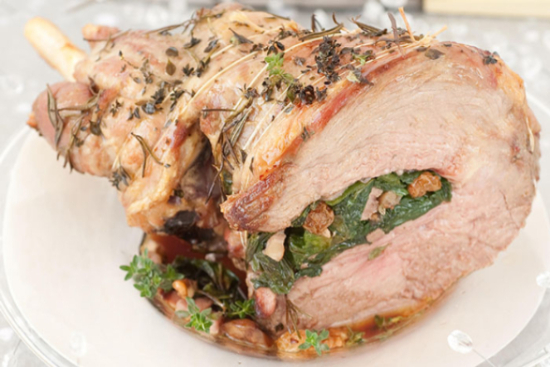
Serves: 8
Preparation time:30 minutes
Cooking time:1 hour
2 tablespoons olive oil 2 cloves garlic, minced
1/4 cup pitted oil cured olives, chopped
1/4 cup finely chopped walnuts
1 pound fresh spinach, stemmed, steamed until barely wilted, squeezed as dry as possible and finely chopped
salt and pepper to taste
1 (5-6 pound) leg of lamb, boned, butterflied and slightly flattened
olive oil
1 teaspoon dried oregano
1 teaspoon chopped rosemary
1 teaspoon dried thyme
1/2 teaspoon ground cumin
salt and pepper
Heat 2 tablespoons olive oil in a heavy skillet. Add garlic, olives and walnuts. Sauté, stirring, for 1 minute. Add spinach and sauté 2 minutes longer. Season with salt and pepper. Lay lamb out flat. Spread spinach mixture over the lamb. Roll up lengthwise and tie tightly in several places with kitchen string. Rub olive oil over all of the roast. Combine herbs and seasonings on a sheet of waxed paper. Roll the tied roast in them until the outside is well covered, pressing the seasonings into the lamb well with your hands.**
Place the roast in a roasting pan. Roast 10 minutes at 425 degrees. Reduce heat to 375 degrees and roast for 40 minutes longer, or until thermometer inserted into the centre reaches 140 degrees for medium rare (cook longer for more well done). Remove roast from oven and let stand, covered at room temperature 10 to 15 minutes before carving.
**At this point, the roast can be refrigerated, well cover ed, for several hours or overnight before cooking.
Place the roast in a roasting pan. Roast 10 minutes at 425 degrees. Reduce heat to 375 degrees and roast for 40 minutes longer, or until thermometer inserted into the centre reaches 140 degrees for medium rare (cook longer for more well done). Remove roast from oven and let stand, covered at room temperature 10 to 15 minutes before carving.
**At this point, the roast can be refrigerated, well cover ed, for several hours or overnight before cooking.
Main Lamb shanks braised in red wine 
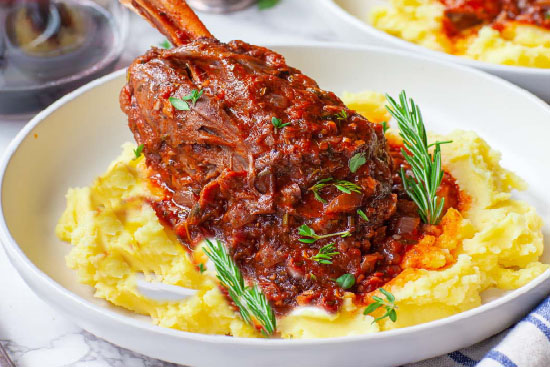
Serves: 6
Preparation time: 40 minutes
Cooking time:3 hours
6 lamb shanks, about 1 1/4 pound each to taste salt and pepper
3 teaspoons olive oil
2 teaspoons crushed black peppercorns
2 bay leaves
8 cups vegetable stock or chicken stock
3 cups dry red wine
2 heads garlic, halved crosswise
4 ribs celery, cut into large dice
4 carrots, cut into large dice
1 large onion, peeled and cut into small wedges
1 cup mushrooms, thickly sliced
ROASTED GARLIC AND WHITE BEAN PUREE
Makes about 3 cups
1 1/2 cups dry Great Northern beans
1 onion, cut into 1/4-inch dice
1 rib of celery, cut into 1/4-inch dice
1 carrot, cut into 1/4-inch dice
2 cloves of garlic (1 smashed and 1 minced) and 1 bay leaf
2 sprigs fresh thyme plus 1 teaspoon thyme leaves
6 cups chicken broth
Coarse salt and pepper, to taste
1/3 cup heavy cream
Heat oven to 425 degrees.
Season shanks with salt and pepper. In a large, high-sided oven proof pot, heat the oil until barely smoking.
Sear the shanks in batches until brown on all sides. Put all the shanks in the pot; add peppercorns, bay leaves, stock, wine, garlic, celery, carrots, onions and mushrooms.
Put the pot in the oven and cook until meat is tender, about 2 hours. (can be made a day ahead).
Remove the shanks, mushrooms and onions and set aside. Cover with foil.
Strain the braising liquid into a medium saucepan. Degrease carefully and simmer to reduce the cooking liquid to about one third.
Pour sauce over the shanks and vegetables.
Serve with roasted garlic and white bean puree.
ROASTED GARLIC AND WHITE BEAN PUREE
1. Soak the beans overnight. Or place beans in a pot, cover with cold water and bring to a boil over high heat; remove from heat and set aside, covered, for 1 hour.
2. Drain the beans; transfer to a 2-quart pot with the diced onion, celery, carrot, smashed garlic, bay leaf, thyme sprigs, 5 cups of broth, salt, and pepper to taste. Bring to a boil. Lower the heat; simmer until beans are very tender, about 90 minutes. If the mixture becomes dry, add some of the remaining broth.
3. Drain the beans; discard the thyme sprigs and bay leaf. Warm the beans in a pan over medium heat. Add the cream, thyme leaves, minced garlic, salt, and pepper. Let simmer. Cook until the cream is reduced and is almost dry on the beans, about 4 to 5 minutes.
4. Puree the beans in a food processor. Adjust seasonings.
Season shanks with salt and pepper. In a large, high-sided oven proof pot, heat the oil until barely smoking.
Sear the shanks in batches until brown on all sides. Put all the shanks in the pot; add peppercorns, bay leaves, stock, wine, garlic, celery, carrots, onions and mushrooms.
Put the pot in the oven and cook until meat is tender, about 2 hours. (can be made a day ahead).
Remove the shanks, mushrooms and onions and set aside. Cover with foil.
Strain the braising liquid into a medium saucepan. Degrease carefully and simmer to reduce the cooking liquid to about one third.
Pour sauce over the shanks and vegetables.
Serve with roasted garlic and white bean puree.
ROASTED GARLIC AND WHITE BEAN PUREE
1. Soak the beans overnight. Or place beans in a pot, cover with cold water and bring to a boil over high heat; remove from heat and set aside, covered, for 1 hour.
2. Drain the beans; transfer to a 2-quart pot with the diced onion, celery, carrot, smashed garlic, bay leaf, thyme sprigs, 5 cups of broth, salt, and pepper to taste. Bring to a boil. Lower the heat; simmer until beans are very tender, about 90 minutes. If the mixture becomes dry, add some of the remaining broth.
3. Drain the beans; discard the thyme sprigs and bay leaf. Warm the beans in a pan over medium heat. Add the cream, thyme leaves, minced garlic, salt, and pepper. Let simmer. Cook until the cream is reduced and is almost dry on the beans, about 4 to 5 minutes.
4. Puree the beans in a food processor. Adjust seasonings.
Main Lamb stew 
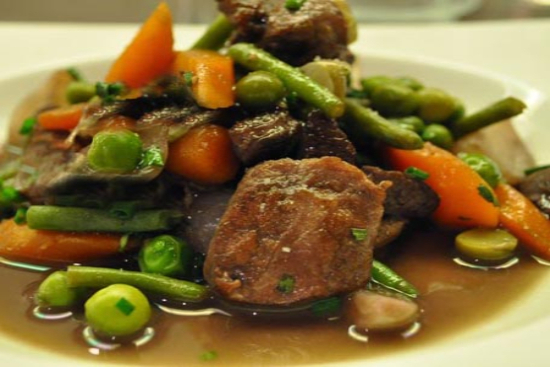
Serves: 8
Preparation time: 30 minutes
Cooking time:1 hour 30 minutes
4 pounds lamb shoulder, cut into 2 inch pieces 3 tablespoons olive oil
1 large onion, finely chopped
4 cloves garlic, crushed and chopped
3 tablespoons tomato paste
3 tablespoons flour
salt and black ground pepper to taste
1 bouquet garni
1 tablespoon chopped parsley
Garnish:
1 pound carrots, peeled
1 pound white turnips, peeled
8 ounces green peas
8 ounces green beans, trimmed
8 ounces pearl onions, peeled
1 1/2 pounds potatoes, peeled
Preheat oven to 350 degrees.
In oven-proof skillet, heat up oil to a smoking point. Brown the lamb pieces. Add onions. Mix with he lamb and brown lightly. Sprinkle the meat with the flour and mix well. Place in the oven for 5 minutes to brown the flour.
Take out of the oven, cover the meat with water. Add tomato paste, garlic, bouquet garni, salt and pepper.
Cover pot, and cook the stew in the oven for 30 minutes.
Evenly shape the carrots, turnips, and potatoes into small footballs. Cut the beans into 1 inch pieces.
Add potatoes and all vegetables to stew. Continue baking until meat and vegetables are tender.
Transfer stew to a serving dish. Sprinkle with parsley and serve hot.
In oven-proof skillet, heat up oil to a smoking point. Brown the lamb pieces. Add onions. Mix with he lamb and brown lightly. Sprinkle the meat with the flour and mix well. Place in the oven for 5 minutes to brown the flour.
Take out of the oven, cover the meat with water. Add tomato paste, garlic, bouquet garni, salt and pepper.
Cover pot, and cook the stew in the oven for 30 minutes.
Evenly shape the carrots, turnips, and potatoes into small footballs. Cut the beans into 1 inch pieces.
Add potatoes and all vegetables to stew. Continue baking until meat and vegetables are tender.
Transfer stew to a serving dish. Sprinkle with parsley and serve hot.
Main Leg of baby lamb nicoise 
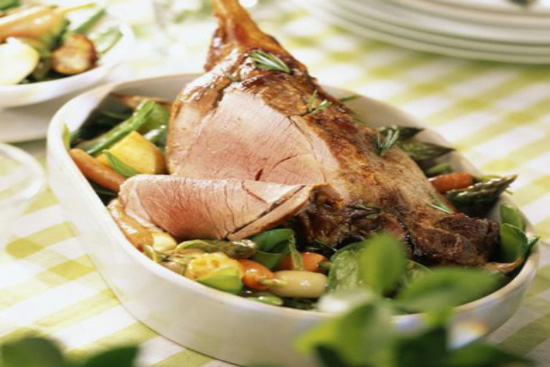
Serves: 6
Preparation time: 30 minutes
Cooking time:50 minutes
3 lemons 16 baby artichokes
2 legs of baby lamb, 2 1/2 pounds each
1 teaspoon black peppercorns, crushed
3 tablespoons olive oil
2 sprigs fresh thyme
1 bay leaf
1/2 cup onion, chopped
2 garlic cloves, chopped
salt and pepper to taste
1 teaspoon honey
8 plum tomatoes, cored, peeled, halved lengthwise, seeds discarded
1/4 cup black Nicoise olives, pitted
1 tablespoon italian parsley, chopped
Zest lemons and cut into julienne. Make juice with two.
Zest lemons and cut into julienne. Make juice with two.
Using a lemon zester or a microplane, remove the very top layer of lemon skin and as little as possible of the spongy white pith lying just beneath. All of the aromatic and tasty oils reside in that top layer, while the pith starts to get pretty bitter. Blanch lemon zest in boiling water. Strain and set aside.
Remove the outer leaves of the baby artichokes. Cut off leaves 1 inch above the hearts, and trim the bottoms until round and smooth. Halve the artichokes lengthwise and toss them in 1 tablespoon lemon juice. Set aside.
Remove lamb hip bone and fat. Season with pepper and salt. Heat oil in a roasting pan.
Brown lamb on all sides. Add thyme, bay leaf, onion, garlic, salt and pepper and artichokes. Stir well.
Roast in 425 degree oven 25 to 30 minutes tossing vegetables every 10 minutes.
Brush the legs with the honey, pour 2 tablespoons lemon juice over meat with lemon zest. Mix well and roast for 5 minutes. Add tomatoes and roast for 15 minutes.
Remove from oven when done. For rare inside temperature of lamb is 130 to 140 degrees, medium-rare, 145-155, and for well done, above 170 degrees.
Transfer lamb to a platter. Add 2 tablespoons water to vegetable mix. Taste for seasonings. Crush pitted olives with a mallet.
Carve lamb, surround with vegetables. Sprinkle with olives.
Using a lemon zester or a microplane, remove the very top layer of lemon skin and as little as possible of the spongy white pith lying just beneath. All of the aromatic and tasty oils reside in that top layer, while the pith starts to get pretty bitter. Blanch lemon zest in boiling water. Strain and set aside.
Remove the outer leaves of the baby artichokes. Cut off leaves 1 inch above the hearts, and trim the bottoms until round and smooth. Halve the artichokes lengthwise and toss them in 1 tablespoon lemon juice. Set aside.
Remove lamb hip bone and fat. Season with pepper and salt. Heat oil in a roasting pan.
Brown lamb on all sides. Add thyme, bay leaf, onion, garlic, salt and pepper and artichokes. Stir well.
Roast in 425 degree oven 25 to 30 minutes tossing vegetables every 10 minutes.
Brush the legs with the honey, pour 2 tablespoons lemon juice over meat with lemon zest. Mix well and roast for 5 minutes. Add tomatoes and roast for 15 minutes.
Remove from oven when done. For rare inside temperature of lamb is 130 to 140 degrees, medium-rare, 145-155, and for well done, above 170 degrees.
Transfer lamb to a platter. Add 2 tablespoons water to vegetable mix. Taste for seasonings. Crush pitted olives with a mallet.
Carve lamb, surround with vegetables. Sprinkle with olives.
Main Navarin of lamb with vegetables 
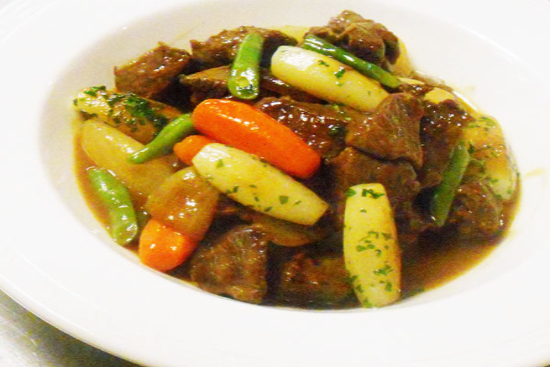
Serves: 8
Preparation time: 30 minutes
Cooking time:50 minutes
4 pounds lamb shoulder, cut into 2 inch pieces 3 tablespoons olive oil
1 large onion, finely chopped
4 cloves garlic, crushed and chopped
3 tablespoons tomato paste
3 tablespoons flour
salt and black ground pepper to taste
1 bouquet garni
1 tablespoon chopped parsley
Garnish:
1 pound carrots, peeled
1 pound white turnips, peeled
8 ounces green peas
8 ounces green beans, trimmed
8 ounces pearl onions, peeled
1 1/2 pounds potatoes, peeled
Preheat oven to 350 degrees.
In oven-proof skillet, heat up oil to a smoking point. Brown the lamb pieces. Add onions. Mix with he lamb and brown lightly. Sprinkle the meat with the flour and mix well. Place in the oven for 5 minutes to brown the flour.
Take out of the oven, cover the meat with water. Add tomato paste, garlic, bouquet garni, salt and pepper.
Cover pot, and cook the stew in the oven for 30 minutes.
Evenly shape the carrots, turnips, and potatoes into small footballs. Cut the beans into 1 inch pieces.
Add potatoes and all vegetables to stew. Continue baking until meat and vegetables are tender.
Transfer stew to a serving dish. Sprinkle with parsley and serve hot.
In oven-proof skillet, heat up oil to a smoking point. Brown the lamb pieces. Add onions. Mix with he lamb and brown lightly. Sprinkle the meat with the flour and mix well. Place in the oven for 5 minutes to brown the flour.
Take out of the oven, cover the meat with water. Add tomato paste, garlic, bouquet garni, salt and pepper.
Cover pot, and cook the stew in the oven for 30 minutes.
Evenly shape the carrots, turnips, and potatoes into small footballs. Cut the beans into 1 inch pieces.
Add potatoes and all vegetables to stew. Continue baking until meat and vegetables are tender.
Transfer stew to a serving dish. Sprinkle with parsley and serve hot.
Main Rack of lamb with mushroom crust 
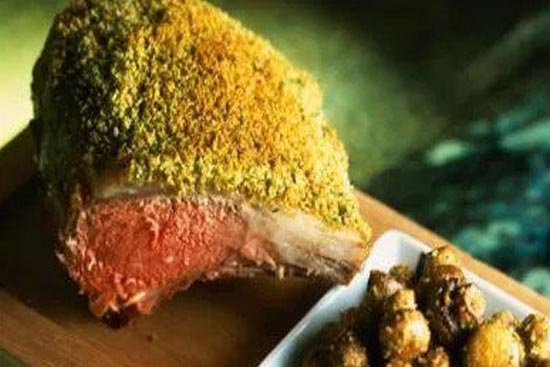
Serves: 4
Preparation time: 20 minutes
Cooking time:30 minutes
2 ounces dried black trumpet or other dried mushrooms 1 egg
salt and black pepper to taste
flour for dredging
2 racks of lamb, boned and trimmed
4 medium leeks, trimmed of hard green parts, split in half, well washed and roughly chopped
1 tablespoon butter
4 tablespoons extra virgin olive oil
4 ounces fresh shiitake, trimmed and cut into chunks
2 cloves garlic, lightly smashed
2 sprigs thyme
In a coffee grinder or spice grinder, grind dried mushrooms to the consistency of coffee. Set aside.
Beat egg in a bowl, with salt and pepper. Dip lamb in flour, shaking off excess. Dip it into egg, and then into mushrooms.
Pat mushrooms to adhere; coat lamb heavily. Refrigerate for about 1 hour or up to 4 hours.
Cook leeks in salted boiling water. Drain, and puree with butter. Season with salt and pepper. Reserve. In a medium skillet, heat half of the oil. Saute mushrooms, garlic and thyme until mushrooms are tender.
Preheat oven to 500 degrees. Place remaining oil in an oven-proof skillet. Heat to medium-high. Add lamb.
Cook for 2 minutes on one side. Turn and place skillet in the oven for 5 to 6 minutes for rare, medium-rare, (125 degrees) or longer for medium. Let lamb rest for 5 minutes then cut into 3/4-inch-thick slices.
Place a dollop of leek purée on each plate; top with portions of mushrooms. Place lamb on top.
Beat egg in a bowl, with salt and pepper. Dip lamb in flour, shaking off excess. Dip it into egg, and then into mushrooms.
Pat mushrooms to adhere; coat lamb heavily. Refrigerate for about 1 hour or up to 4 hours.
Cook leeks in salted boiling water. Drain, and puree with butter. Season with salt and pepper. Reserve. In a medium skillet, heat half of the oil. Saute mushrooms, garlic and thyme until mushrooms are tender.
Preheat oven to 500 degrees. Place remaining oil in an oven-proof skillet. Heat to medium-high. Add lamb.
Cook for 2 minutes on one side. Turn and place skillet in the oven for 5 to 6 minutes for rare, medium-rare, (125 degrees) or longer for medium. Let lamb rest for 5 minutes then cut into 3/4-inch-thick slices.
Place a dollop of leek purée on each plate; top with portions of mushrooms. Place lamb on top.
Main Roasted lamb rib eye with sweet garlic 
Serves: 6
Preparation time: 30 minutes
Cooking time:40 minutes
3 single racks of lamb 1 medium onion
1 large carrot
1 stalk of celery
6 peppercorns
2 bay leaves
3 cups veal stock
coarse salt and pepper to taste
1 pound Swiss chard
2 teaspoons olive oil
1 1/2 tablespoons chopped fresh rosemary
12 cloves garlic, peeled
6 sprigs fresh rosemary
Remove the eye from each rack of lamb, leaving a bit of the cap fat (the layer of fat that covers the eye) on the meat and chopping the bones. Reserve the bones and meat scraps.
Peel and trim onion and carrot. Wash and trim celery. Dice the onion and cut the carrot and celery crosswise into 1/2-inch thick slices.
Combine vegetables with the lamb bones and scraps, peppercorns, and bay leaves in large roasting pan.
Roast, stirring occasionally until golden brown. Remove from oven and place over medium high heat. Add 6 cups of water and the veal stock and bring to a boil.
Simmer for 45 minutes. Remove from heat. Strain liquid in saucepan and discard the solids. Skim fat from top of the liquid. Simmer until reduced to 1 1/2 cups. Taste and adjust seasonings.
Wash the chard and remove any tough stems. Place in boiling salted water to cover and blanch for 30 seconds.
Drain and refresh under cold running water. Wrap in a clean kitchen towel and twist to squeeze out all moisture. Unwrap and set aside. Preheat oven to 400 degrees.
Heat the oil in large ovenproof skillet over medium heat.
Season the lamb with chopped rosemary and salt and pepper. Place, fat side down, in the hot pan and sear until nicely browned. Add garlic and sear the remaining sides until just browned, turning garlic as lamb sears. Place pan in oven and roast until medium rare on an instant read thermometer. Remove from oven and place on rack to rest for 5 minutes. Lightly cover and keep warm.
Carefully, pick garlic out of the pan, making sure no grease is attached, and add to the reserved sauce.
Place over medium heat to heat through. Wipe lamb roasting pan clear of excess grease.
Return to medium heat and add reserved chard. Saute, adding 1 tablespoon olive oil, if necessary until heated through. Season with salt and pepper.
Place equal portions of chard in the center of each of 6 warm plates. Slice each rib eye into 6 pieces.
Arrange 3 slices on top of chard. Spoon some sauce, along with 2 garlic cloves per serving over the lamb. Place a rosemary sprig in the center.
Peel and trim onion and carrot. Wash and trim celery. Dice the onion and cut the carrot and celery crosswise into 1/2-inch thick slices.
Combine vegetables with the lamb bones and scraps, peppercorns, and bay leaves in large roasting pan.
Roast, stirring occasionally until golden brown. Remove from oven and place over medium high heat. Add 6 cups of water and the veal stock and bring to a boil.
Simmer for 45 minutes. Remove from heat. Strain liquid in saucepan and discard the solids. Skim fat from top of the liquid. Simmer until reduced to 1 1/2 cups. Taste and adjust seasonings.
Wash the chard and remove any tough stems. Place in boiling salted water to cover and blanch for 30 seconds.
Drain and refresh under cold running water. Wrap in a clean kitchen towel and twist to squeeze out all moisture. Unwrap and set aside. Preheat oven to 400 degrees.
Heat the oil in large ovenproof skillet over medium heat.
Season the lamb with chopped rosemary and salt and pepper. Place, fat side down, in the hot pan and sear until nicely browned. Add garlic and sear the remaining sides until just browned, turning garlic as lamb sears. Place pan in oven and roast until medium rare on an instant read thermometer. Remove from oven and place on rack to rest for 5 minutes. Lightly cover and keep warm.
Carefully, pick garlic out of the pan, making sure no grease is attached, and add to the reserved sauce.
Place over medium heat to heat through. Wipe lamb roasting pan clear of excess grease.
Return to medium heat and add reserved chard. Saute, adding 1 tablespoon olive oil, if necessary until heated through. Season with salt and pepper.
Place equal portions of chard in the center of each of 6 warm plates. Slice each rib eye into 6 pieces.
Arrange 3 slices on top of chard. Spoon some sauce, along with 2 garlic cloves per serving over the lamb. Place a rosemary sprig in the center.
Dessert Key lime pie 
Serves: 8
Preparation time: 30 minutes
Cooking time:25 minutes
1 9-inchGraham cracker crumb recipe
2 14-ounce cans condensed milk
6 egg yolks
1 cup lime juice
4 egg whites
1/4 teaspoon cream of tartar
3/4 cup confectioners sugar
Preheat oven to 350 degrees.
In a mixing bowl, beat condensed milk with egg yolks. Mix in the lime juice.
Pour the mixture into the prepared crust. Bake for 20 minutes or until pie is firm in center.
In an electric mixing bowl, beat the egg whites with cream of tartar until firm.
Gradually add sugar and continue whipping to form stiff peaks. Spread or pipe egg whites over the baked pie.
Bake at 325 degrees until golden brown Cool pie on rack and refrigerate before serving. Cut into 8 equal portions. Decorate plates with lime gratings and slices.
In a mixing bowl, beat condensed milk with egg yolks. Mix in the lime juice.
Pour the mixture into the prepared crust. Bake for 20 minutes or until pie is firm in center.
In an electric mixing bowl, beat the egg whites with cream of tartar until firm.
Gradually add sugar and continue whipping to form stiff peaks. Spread or pipe egg whites over the baked pie.
Bake at 325 degrees until golden brown Cool pie on rack and refrigerate before serving. Cut into 8 equal portions. Decorate plates with lime gratings and slices.
conversion of liquids
Weights
Temperatures
Measures of non liquid ingredients
Non-liquid ingredients in volume converted
|
|||||||
|---|---|---|---|---|---|---|---|
Ingredient |
1 cup |
3/4 cup |
2/3 cup |
1/2 cup |
1/3 cup |
1/4 cup |
2 tablespoons |
| All-purpose wheat flour | 120 g | 90 g | 80 g | 60 g | 40 g | 30 g | 15 g |
| All-purpose sifted wheat flour | 110 g | 80 g | 70 g | 55 g | 35 g | 27 g | 13 g |
| White sugar | 200 g | 150 g | 130 g | 100 g | 65 g | 50 g | 25 g |
| Powdered sugar/Icing sugar | 100 g | 75 g | 70 g | 50 g | 35 g | 25 g | 13 g |
| Brown sugar normally packed | 180 g | 135 g | 120 g | 90 g | 60 g | 45 g | 23 g |
| Corn flour | 160 g | 120 g | 100 g | 80 g | 50 g | 40 g | 20 g |
| Cornstarch | 120 g | 90 g | 80 g | 60 g | 40 g | 30 g | 15 g |
| Rice (not-cooked) | 190 g | 140 g | 125 g | 95 g | 65 g | 48 g | 24 g |
| Macaroni (uncooked) | 140 g | 100 g | 90 g | 70 g | 45 g | 35 g | 17 g |
| Couscous (uncooked) | 180 g | 135 g | 120 g | 90 g | 60 g | 45 g | 22 g |
| Quick oatmeal (uncooked) | 90 g | 65 g | 60 g | 45 g | 30 g | 22 g | 11 g |
| Table salt | 300 g | 230 g | 200 g | 150 g | 100 g | 75 g | 40 g |
| Butter / Margarine | 240 g | 180 g | 160 g | 120 g | 80 g | 60 g | 30 g |
| Shortening | 190 g | 140 g | 125 g | 95 g | 65 g | 48 g | 24 g |
| Fruits and légumes chopped | 150 g | 110 g | 100 g | 75 g | 50 g | 40 g | 20 g |
| chopped walnuts | 150 g | 110 g | 100 g | 75 g | 50 g | 40 g | 20 g |
| Nuts /ground almonds | 120 g | 90 g | 80 g | 60 g | 40 g | 30 g | 15 g |
| Fresh bread crumbs (not packed) | 60 g | 45 g | 40 g | 30 g | 20 g | 15 g | 8 g |
| Dry bread crumbs | 150 g | 110 g | 100 g | 75 g | 50 g | 40 g | 20 g |
| Parmesan grated | 90 g | 65 g | 60 g | 45 g | 30 g | 22 g | 11 g |
| Chocolate chips | 150 g | 110 g | 100 g | 75 g | 50 g | 38 g | 19 g |

As the sun rises or sets in
FAROE-ISLANDS
"May every sunrise hold more promise, and every sunset hold more peace."
The Pageturner Ecookbooks
Library on a world cooking journey
15 Recipes
14 Main dishes







